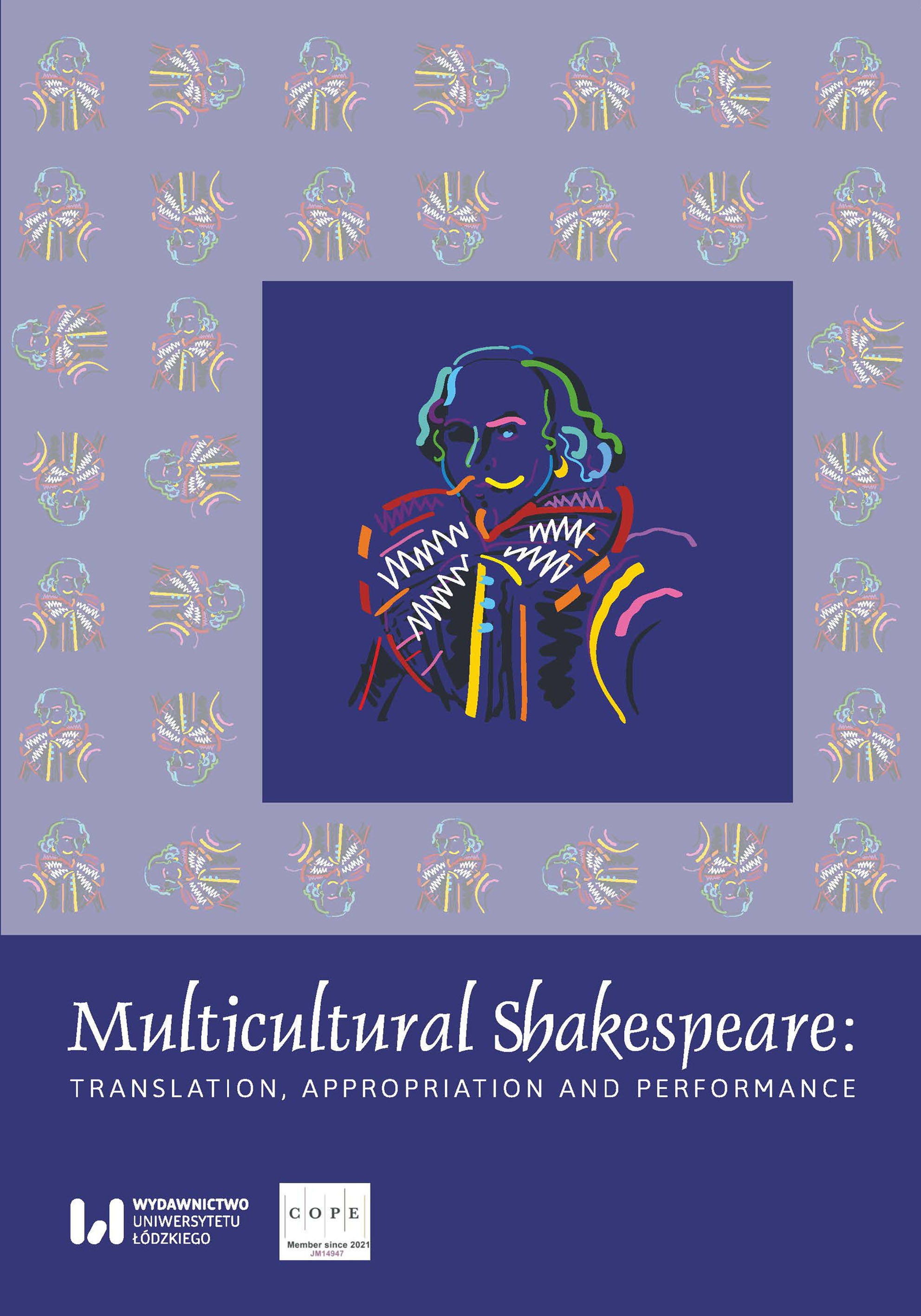Rank Intersectionality and Othello
DOI:
https://doi.org/10.18778/2083-8530.30.05Słowa kluczowe:
colour, Desdemona, Othello, Toni Morrison, rank, whitenessAbstrakt
As a crucial concept in critical theory, intersectionality satisfies a need within global Shakespeare reception studies. The reason for this is the way it permits cross-currents between conceptions of race and gender in particular; it also allows for an awareness of the historical and cultural location of the audience or reader as distinct from the moment of the production of a particular play. It is therefore fundamentally dynamic and can be further extended via discussions of rank, sexuality or religion. This essay argues for the importance of a lively approach to intersectionality that integrates concerns of race and gender in Othello with social rank in Shakespearean Venice and Cyprus. The article deliberately eschews a psychological analysis of character, insisting that a sense of inwardness, that these stage figures should somehow be treated as though they were real people, is a much later, modern preoccupation. Instead, the play is treated as not only early modern but pre-modern. This is also why there is no treatment of class as such; that too is a much later modern category that carries all sorts of baggage, anachronistic and otherwise. Class is not a sophisticated enough notion to account adequately for the permutations in a society that was obsessed with tiny gradations in rank, dignity and honour. Beginning with reference to Toni Morrison’s conceptualization of modern American literature as predicated on a constructed whiteness, the essay moves by analogy back towards Shakespeare’s drama to the structured interplay between gender, rank and race that is this play. Althusser’s sense of interpellation is revived in order adequately to describe how these positions work to emplace Othello and Desdemona in order to open up the play to a global perspective that accounts for multiple possibilities. The article therefore goes well beyond the old familiar groupings so beloved of character-based criticism, instead insisting on the primacy of social definitions of the positions available to the personages in the play.
Pobrania
Bibliografia
(99+) Academia.edu | Search | intersectionality and class. Accessed 19 June 2024.
Google Scholar
Althusser, Louis. On the Reproduction of Capitalism. Trans. G. M. Goshgarian. London: Verso, 2014.
Google Scholar
Amussen, Susan Dwyer. An Ordered Society: Gender and Class in Early Modern England. New York and Oxford: Columbia University Press, 1988.
Google Scholar
Aristotle. “On The Art Of Poetry.” Gutenberg.org. https://www.gutenberg.org/files/6763/6763-h/6763-h.htm Accessed 19 July 2024.
Google Scholar
Barker, Francis and Peter Hulme. “‘Nymphs and reapers heavily vanish:’ The Discursive con-texts of The Tempest.” Alternative Shakespeares. Ed. John Drakakis. London: Routledge, 1985. 191-205.
Google Scholar
Brown, Paul. “‘This thing of darkness I acknowledge mine:’ The Tempest and the Discourse of Colonialism.” Political Shakespeare: Essays in Cultural Materialism. Eds. Jonathan Dollimore and Alan Sinfield. Manchester: Manchester UniversityPress, 1985. 48-71.
Google Scholar
DOI: https://doi.org/10.2307/3817135
Dollimore, Jonathan and Alan Sinfield, eds. Political Shakespeare: Essays in Cultural Materialism. Manchester: Manchester University Press, 1985.
Google Scholar
Drakakis, John, ed. Alternative Shakespeares. London: Routledge, 1985.
Google Scholar
Dutton, Richard. Ben Jonson, Volpone and the Gunpowder Plot. Cambridge: Cambridge University Press, 2008.
Google Scholar
Eagleton, Terry. Sweet Violence: The Idea of the Tragic. Oxford: Blackwell, 2003.
Google Scholar
Faculty Positions jobs (chronicle.com). Accessed 19 June 2024.
Google Scholar
French, J. Milton. “Othello Among the Anthropophagi.” PMLA 49.3 (1934): 807-809.
Google Scholar
DOI: https://doi.org/10.2307/458379
Hall, Kim F. Things of Darkness: Economies of Race and Gender in Early Modern England. Cornell University Press, 1995.
Google Scholar
DOI: https://doi.org/10.7591/9781501725456
Howard, Jean E. and Marion F. O’Conner, eds. Shakespeare Reproduced: The Text in History and Ideology. London: Routledge, 1988.
Google Scholar
Innes, Paul. “Harming Macbeth: A British Translation” in Liz Oakley-Brown ed. Shakespeare and the Translation of Identity in Early Modern England. London and New York: Continuum, 2011. 103-130.
Google Scholar
DOI: https://doi.org/10.5040/9781472555250.ch-004
Innes, Paul. Shakespeare’s Roman Plays. London: Palgrave Macmillan, 2015.
Google Scholar
DOI: https://doi.org/10.1007/978-1-137-02592-0
Liebler, Naomi. Shakespeare’s Festive Tragedy: The Ritual Foundations of Tragedy. London: Routledge, 1995.
Google Scholar
Little, Arthur L. Shakespeare Jungle Fever: National-Imperial Re-Visions of Race, Rape, and Sacrifice. California: Stanford University Press, 2000.
Google Scholar
Loomba, Ania. Shakespeare, Race, and Colonialism. Oxford: Oxford University Press, 2002.
Google Scholar
MacCrossan, Colm. “‘What, in a Town of War… to Manage Private and Domestic Quarrel?:’ Othello and the Tragedy of Cyprus.” Shakespeare 16.3 (2020): 239-257.
Google Scholar
DOI: https://doi.org/10.1080/17450918.2020.1792538
Morrison, Toni. Playing in the Dark: Whiteness and the Literary Imagination. New York: Penguin Random House, 1993.
Google Scholar
Oakley-Brown, Liz, ed. Shakespeare and the Translation of Identity in Early Modern England. London and New York: Continuum, 2011.
Google Scholar
Othello: names—The Bill / Shakespeare Project (thebillshakespeareproject.com). Accessed 19 June 2024.
Google Scholar
Parker, Patricia and Geoffrey Hartman, eds. Shakespeare and the Question of Theory. London: Rutledge, 1993.
Google Scholar
Proudfoot, Richard, et al., eds. The Arden Shakespeare Third Series Complete Works. London and New York: Bloomsbury, 2021.
Google Scholar
Quayson, Ato. Tragedy and Postcolonial Literature. Cambridge: Cambridge University Press, 2021.
Google Scholar
DOI: https://doi.org/10.1017/9781108921992
Sinfield, Alan. Faultlines: Cultural Materialism and the Politics of Dissident Reading. Oxford: Oxford University Press, 1992.
Google Scholar
DOI: https://doi.org/10.1093/oso/9780198119838.001.0001
Steingass, Benjamin. “Othello-dor: Racialized Odor In and On Othello.” Multicultural Shakespeare: Translation, Appropriation and Performance 22 (37) (2022): 37-49.
Google Scholar
DOI: https://doi.org/10.18778/2083-8530.22.03
Thomson, Ayanna, ed. The Cambridge Companion to Shakespeare and Race. Cambridge: Cambridge University Press, 2021.
Google Scholar
DOI: https://doi.org/10.1017/9781108684750
Vaughan, Virginia Mason. Othello: A Contextual History. Cambridge: Cambridge University Press, 1996.
Google Scholar
Worthen, W. B. “The Weight of Antony: Staging ‘Character’ Antony and Cleopatra.” Studies in English Literature 26 (1986): 295-308.
Google Scholar
DOI: https://doi.org/10.2307/450509
Pobrania
Opublikowane
Jak cytować
Numer
Dział
Licencja

Utwór dostępny jest na licencji Creative Commons Uznanie autorstwa – Użycie niekomercyjne – Bez utworów zależnych 4.0 Międzynarodowe.












